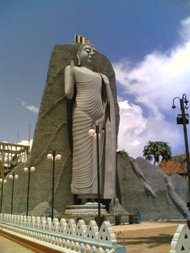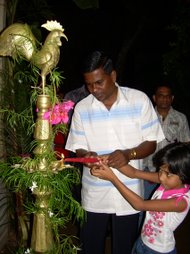Sundown with Sir Arthur C Clarke
Jeff Greenwald
When last I saw Arthur C. Clarke, in March of 2005, his memory was already fading. It was late afternoon. We sat on the patio of the Galle Face Hotel, one of Arthur's favourite spots in Colombo, Sri Lanka. It had been nine years since my last visit to his adopted island.
Now I was back working with Mercy Corps, an international aid agency, on a tsunami relief project. Clarke sipped his tea and stared West, where the Indian Ocean stretched in an uninhibited arc to the coast of Somalia.
"I don't remember anything about working with Stanley (Kubrick) on 2001," he said, "or my months at the Chelsea Hotel. I don't remember my last scuba dive, or what my mother's face looked like. The only thing I remember with any real clarity is the first kiss with the love of my life and our last words, before we parted."
| |
Clarke hadn't remembered me, either, at our reunion two months earlier. Despite our 35 years of friendship, he'd glanced up in bewilderment when I entered his library and approached the desk that served as his command center. But Arthur was never one to relinquish the upper hand, and opened with an aggressive challenge.
"Have you heard the Titan wind?"
I shook my head dumbly, a gesture Clarke met with a look of total exasperation. "Well, then, come here, come on, hurry up..." His impatience was immediately replaced with glee. "Listen to this," he said, clicking his mouse. A static hiss sighed from the speakers. "That's it! Just as I'd written, 30 years ago ...."
A NASA scientist someone who'd read Imperial Earth as a kid, and remembered a reference to the winds on Saturn's largest moon had sent Clarke a recording, just in from the Huygens probe, of the gales blowing across Titan's surface. I had no idea such a recording even existed; to Clarke, it was just another example of life imitating art.
I first met Arthur C. Clarke in 1970, as a geek of 16. A year or so earlier, I'd spent an entire afternoon (and much of the evening) in a Long Island movie theater, watching 2001: A Space Odyssey three times in a row.
Afterwards, I began to plow my way through every science fiction book Clarke had written. When I thought I was sufficiently steeped in his work, I wrote him a fan letter. Clarke, who was in New York completing the manuscript for Rendezvous with Rama, responded with a postcard. "I'm at the Hotel Chelsea," he wrote. "Give me a call!"
The result of that meeting was one of the longest, and most important, friendships in my life. During the four decades that followed, Arthur and I would stay in close touch, both of us passionate advocates for a human presence among the stars. I'd send him the latest U.S. space stamps, and news of my science studies.
Arthur, who often co-hosted coverage of the space missions at Cape Canaveral, would sometimes pass a picture postcard around a briefing table, and ask everyone present to sign. One of the cards I received bears greetings from Neil Armstrong and Wernher von Braun, among others. (Many years later I was able to return the favour by introducing Arthur to a fellow cosmology buff, the Dalai Lama.)
Arthur C. Clarke was one of the most generous writers, and scientists, of this or any age. His novels and essays hold out hope not just for the survival of humanity, but for our transcendence. He was a devoted humanist, and rarely refused a request to meet a fan even casual visitors who simply wished to shake his hand. (His generosity did have its limits. Once, in one of my own books, I remarked that Arthur had displayed consummate selflessness by refusing to patent the communications satellite.
I sent him a copy, thinking he'd be pleased. "You can't patent an orbit," he dryly informed me. "And the only reason I didn't patent the Comsat was that I didn't know how to build one.
Had I been a bit smarter, I'd be a trillionaire.") But his full contribution will be impossible to evaluate. Clarke was so influential a visionary, and contributed so much to technological culture, that one can hardly tell where his imagination ends and our reality begins.
From geosynchronous orbits to space elevators, from The Sands of Mars to The Songs of Distant Earth, Clarke's vision is marbled through the bedrock of today's scientific zeitgeist.
During the four decades of our friendship, I visited Clarke in Sri Lanka four times: in 1983, 1993 (for Wired 1.03), 1996 (for a book about Star Trek, which blossomed out of Gene Roddenberry's admiration for Clarke) and 2005.
Each visit to his "technoasis," in the suburbs of Colombo, was a nonstop encounter with the latest gadgets, books, video clips, toys and jokes on Clarke's radar. On one occasion, he spent hours showing me time-lapse animation of the terraforming of Mars; on another, he turned on a monitor and used a video hookup, connected to his powerful new telescope, to provide the illusion of a trip to the moon.
A master of the lightning joust, a lover of practical jokes and a shark at table tennis, Clarke was one of the most animated people I've known. A few days before our last meeting at the Galle Face Hotel, I'd been riding along the Colombo waterfront with Arthur's close friend, Valerie Ekanayake. We'd spied his vintage Mercedes by the beach, and pulled up alongside.
This would be our second meeting in a week. Valerie knocked on Clarke's window, and pointed to me. "Do you remember Jeff?" Clarke rolled his eyes. "I'd just this minute managed to forget."
During our final encounter, though, Clarke seemed melancholy and circumspect. There was no way to avoid a comparison with the beleaguered HAL, who remains self-aware as his magnificent consciousness is slowly dissembled. As the sun lowered toward the ocean, I understood that Clarke who never believed in any notion of an external god, heaven or hell - knew that his own mind would soon be going, dissolving into an even larger sea.
We sat in silence, aware that the world was turning, and that this might be our last moment together. Suddenly, Arthur reached over the table. "Give me your sunglasses," he demanded. "Quick, quick!" I did. He grabbed them, and slipped them on over his own. "This," he declared, leaning back, "is the best time to see sunspots if there are any."
Though it had been 12 years, I clearly remembered the last line of our 1993 Wired interview. It was Clarke's chosen epitaph, which he shared with gleeful pride: "He never grew up but he never stopped growing." I watched my old friend as he stared at the sun, studying its face with undiminished curiosity.
(Wired.com)
The final goodbye from Colombo
I have never had so many lumps in my throat on a single day as on March 19, 2008 - the day that my long standing friend and mentor Sir Arthur Clarke died.
Yet there was no time for grief or tears in solitude. Literally dozens of media outlets from Sri Lanka and around the world were calling. Radio and TV channels wanted soundbytes...some of them live on the air.
And as his spokesman for nearly a decade, I had to be presentable, clear and cooperative.
My day started at 3 in the morning, barely two hours after his passing away, with the North American media calling. The news had gone round the world at the speed of light. Everybody wanted to know more - how exactly did he die (respiratory complications), did he suffer (not for long), was he conscious to the end (yes, though he couldn't speak due to breathing tubes), etc, etc.
As the planet rotated, other regions of the world came in. The big wire services were all there: Reuters, AP, AFP, as were the big broadcasters - BBC, CNN among them. And then, of course, the Sri Lankan newspapers, websites, radio and TV channels for whom Sir Arthur was a celebrated local hero. Everybody wanted exclusive quotes and soundbytes.
And in an 18 hour mediathon, I ensured that everybody did (and kept them happy, I hope), even if it left me exhausted in the end. I'm back at it after a few hours of sleep. The process will continue until after his funeral, now fixed for Saturday March 22 afternoon at Colombo's main cemetery.
Sir Arthur would have approved. He believed that the show must go on, no matter what. He also wanted us to celebrate, not mourn his passage. And that's the tone of what I have been saying and doing. He left behind an imaginative yet plausible and sometimes daring vision for the future - and now it's up to his fans, admirers and the rest of us to create that future.
I've been too close to the unfolding events to blog about them, but I've just written up the story about Sir Arthur's last video message to the world that I directed last December. Other reflective pieces would follow.
In that last video, which is online at http://www.youtube.com/watch?v=3qLdeEjdbWE, he signed off in his usual style: This is Arthur Clarke, saying Thank You and Goodbye from Colombo!
And this is Nalaka Gunawardene, saying Thank You and Goodbye to Sir Arthur. It was the greatest privilege of my life to have worked with you.





No comments:
Post a Comment